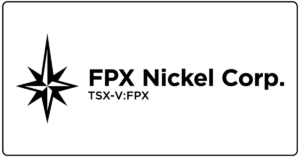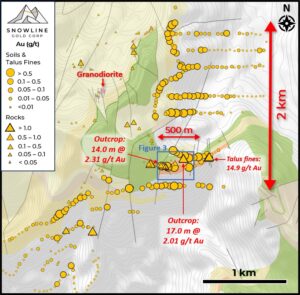February 2, 2021, Vancouver, Canada – Jaxon Mining Inc. (“Jaxon” or the “Company”) (TSX.V: JAX, FSE: OU31, OTC: JXMNF) is pleased to announce a discovery of additional strong copper and moly in soil anomalies at the Razorback target area at Red Springs based on soil geochemistry and rock sampling completed in the 2020 field season by HEG & Associates (Figure 1). The discovery extends the results of the 2019 soil geochemistry study at Primary Ridge also completed by HEG (https://bit.ly/3pDaYvT). Rock sample data collected from 2018 to 2020 are plotted on Figures 1 and 2 for discussion purposes.
Jaxon’s 2020 work program at Red Springs expanded the area covered by the copper/moly in soil anomaly that projects over the Razorback area. The results reveal a continuing copper and molybdenum halo with anomalous grades extending along a northeast to southwest trend from Primary Ridge to Razorback. Proximal to the Cu/Mo halo, an extensive gold-bearing tourmaline breccia pipe/zone occurrence was previously discovered. These coincident discoveries have now been further confirmed and extended by the 2020 soil geochemistry and rock surveys, and additional information from previous geophysical surveys. Individually and together, the copper/moly halo and the tourmaline breccia are known indicators of, and vectors to, commercial scale Cu, Mo, Ag, Au porphyry systems at other locations around the globe. Jaxon is setting out in 2021 to drill test the Cu-Mo porphyry and breccia pipes leading to the Red Springs porphyry target.
Highlights from the 2020 Soil Geochemistry and Rock Sampling Program Completed at the Red Springs Razorback Target
- 50 m x 50 m grid, 658 soil samples and 40 rock samples were taken across the proposed sample stations at the Razorback target area.
- 59 elements in soil and 49 elements in rock including Cu, Mo, Au, Ag, Pb, As and Zn value were analyzed via fire assay for gold and multi-acid digestion with ICP – MS analysis for the multi- element suite at Actlabs in Kamloops, B.C.
- Assay results show two strong Cu in soil anomalies with Cu assay > 500 ppm to 2000 ppm which comprise 10% of the total soil samples in the Bulkley intrusion area, the Cu anomaly in the southwest area is still open to both the south and west directions. Additional soil samples will be collected in the 2021 field work season to define the southwest extension of this Cu in soil anomaly (Figures 1-2).
- Two strong Mo in soil anomalies with Mo assay > 50 ppm to 200 ppm which also comprise approximately 10% of the total soil samples in the Bulkley intrusion area (Figures 1-2).
- One Zn, one Pb, one Sb, one Ag and one As anomaly in the Hazelton Group hornfels area (Figure 2) which are all in the distal area from the Bulkley intrusion.
- In total, there are three strong Cu-Mo in soil anomalies at the Red Springs project (Figures 1-2). Cu/Zn ratios highlight two large centres in the Razorback and Primary Ridge target areas (Figure 3) which reveal typical porphyry system characteristics.
- High-grade rock samples are either from the Cu in soil anomalies area or from the tourmaline breccia zone/pipe area in the distal south area (Figure 2).
- Most importantly, intrusions with disseminated Cu sulfide mineralization have been discovered in these three Cu-Mo in soil anomalous areas (Figure 4), which indicate that these intrusions are the source of the strong Cu-Mo anomalies. All three Cu-Mo in soil anomalies extend more than 2 km long and approximately 1 km wide, indicating the potential distribution range of the Cu-Mo porphyry mineralization.
Mr. Dylan Hunko, Vice President of HEG & Associates, commented, “Soil geochemistry has outlined two very strong mineralized centres, providing a great picture for metal zonation at the Red Springs project. Potential for a high-grade Cu-Mo porphyry system is now supported with strong Cu enrichment of soils displaying values greater than 500 parts per million (ppm) Cu. As the advancement of exploration efforts continue at the Red Springs project, specifically within the Razorback and Primary Ridge target areas, the value of this under-explored land has really come to light. The combination of nearby infrastructure, incredible mineralization within rock samples at surface, soil geochemistry and geophysics has Red Springs primed for the next major porphyry discovery in British Columbia.”
Figure 1. Cu in soil anomalies at Razorback (2020) and Primary Ridge (2019) at the Red Springs project.
Figure 2. Soil sample anomalies and rock samples with Cu assay at Razorback (2020) and Primary Ridge (2019) at the Red Springs project.
Figure 3. Cu/Zn ration centres at Razorback and Primary Ridge at Red Springs (HEG & Associates, 2020)
Figure 4. Altered porphyritic intrusion with disseminated pyrite and chalcopyrite from the Primary Ridge to Razorback porphyry targets (HEG & Associates, 2020)
Soil and Rock Sampling and Analytical Procedures
Soil samples were taken on a 50 m by 50 m grid covering an approximate 2 km2 area over the Primary Ridge target. Approximately 500 g to 600 g of soil was sampled at a depth of approximately 25-30 cm from surface. Soil samples were primarily targeting the B horizon when appropriate and sampled into labelled craft paper bags.
Approximately 50 packaged samples (10 soils per poly bag) were put into labelled rice bags for transport. Security tags were added to rice bags to further increase QAQC protocol. Samples were shipped to Actlabs in Kamloops, B.C. for analysis.
All soil samples were dried at low temperature, 500 g is then screened to -80 mesh before Aqua Regia digestion. A 20 g true Aqua Regia digestion with ICPMS finish and Ultra Trace was selected as the analytical method for soil samples.
Rock samples were taken at the discretion of geologists in the field and were placed into clear poly bags with corresponding lab tags and bag labels. Approximately 10 rock samples were placed into labelled rice bags for transport. Security tags were added to rice bags to further increase QAQC protocol. All rock samples were also shipped to Actlabs in Kamloops, B.C. for analysis.
Rock samples were crushed (to <7 kg) up to 80% and passed through a 2 mm riffle split for a 250 g sample. They were than pulverized via mild steel to 95% passing 105 µm. Rock samples were analyzed via fire assay for gold and multi-acid digestion with ICP – MS analysis for the multi element suite.
Qualified Person
Yingting (Tony) Guo, P.Geo., President of Jaxon Mining Inc., a Qualified Person as defined by National Instrument 43- 101, has reviewed, and prepared the scientific and technical information and verified the data supporting such scientific and technical information contained in this news release.
About Jaxon Mining Inc.
Jaxon is a specialized precious and base metals exploration and project assembly company with a focus on western Canada. Jaxon pursues the discovery of large, mineralized, Cu, Ag, Au polymetallic systems near known metallogenic districts. Jaxon targets underexplored areas with geological settings and event histories that set up the conditions for the propagation of first-order conduits and the generation of extensive metalliferous fluid flows. Jaxon’s targets, generally, have not experienced previous systematic, multi-disciplinary exploration nor have they been tested at deeper horizons. Jaxon is currently focused on drill testing the Netalzul Mt. and Red Springs projects on its Hazelton Property in north-central British Columbia.
ON BEHALF OF THE BOARD OF DIRECTORS
JAXON MINING INC.
“John King Burns”
John King Burns, Chairman
For more information please contact:
Investor Relations
Kaye Wynn Consulting
T: 604-558-2630
TF: 1-888-280-8128
E: info@kayewynn.com
Freeform Communications
T: 604-243-0499
E: enquiries@freeform.com
Corporate
T: 604-424-4488
E: info@jaxonmining.com
https://jaxonmining.com









